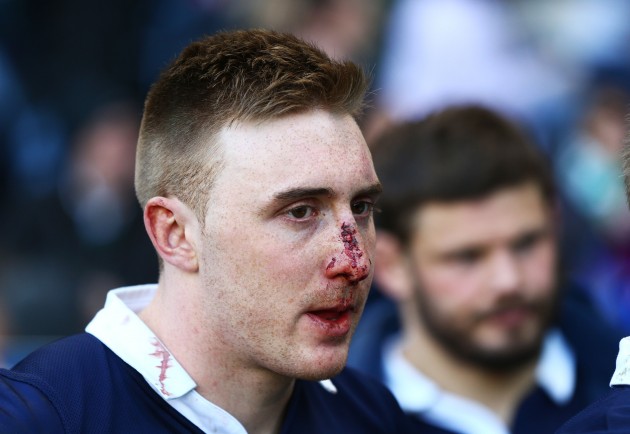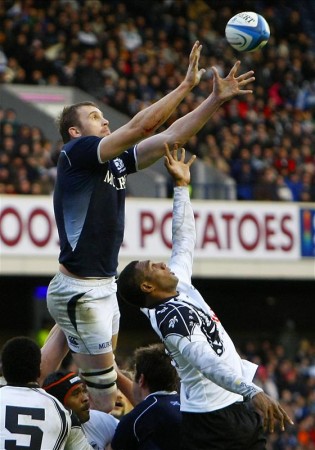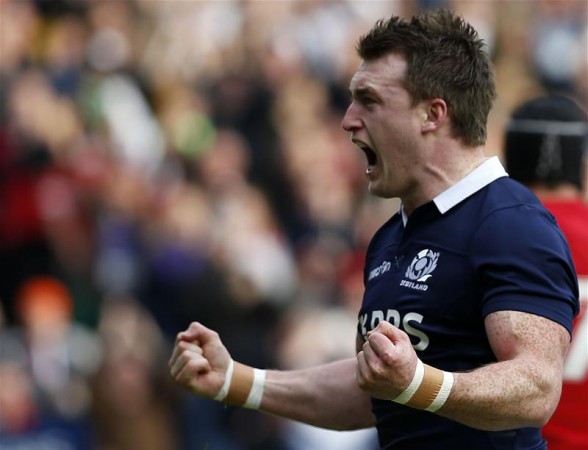Scotland suffered a Six Nations whitewash and finished with the wooden spoon for the first time since 2012, so what lessons can Vern Cotter and co learn from this campaign? Rory Baldwin reports.
Ireland are currently much, much better than us
There was a sneaky hope that Vern Cotter could get some egg on to the face of his chum and sometime coaching partner Joe Schmidt with a shock result on Super Saturday (after all, Brian O Driscoll had retired, right?), but Scotland were comprehensively outthought, outfought and outplayed in the second half at BT Murrayfield.
The most damning indictment of this was a ten-minute spell when a series of kicks by the Irish backs, Johnny Sexton to the fore, pinned Scotland deep inside their own 22. Scotland would secure the lineout, make some yards up the field, then either kick the ball away or turn it over involuntarily and – boom – they were kicked right back to square one in the corner. It was a plan executed almost without flaw, without the coaches telling them to do it, and was totally demoralising to a side low on confidence and badly in need of a plan B.
We’re low on leaders
Should anything have happened to Paul O’Connell (who was fantastic all tournament), Ireland could have called on Jamie Heaslip, Peter O’Mahony, Rory Best and Sexton – every one of them a proven leader.
Scotland had Greig Laidlaw and Ross Ford who are both previous captains of Edinburgh and Scotland and played in all five games. Rob Harley has occasionally captained Glasgow and Jim Hamilton led Gloucester for a while, but there is a very thin layer of leadership experience in this Scotland squad and it is easily skimmed off in the heat of battle.
Many of our experienced leaders – John Barclay, Kelly Brown, Chris Cusiter, and Scottish rugby’s finest leader Al Kellock – were left at home, as was the inexperienced captain elect, Grant Gilchrist.
Some may no longer be part of the playing setup, but if you can’t find big Al a job as a
water-carrier then you’re not thinking straight.
We’re not going to win the World Cup
The Scottish Rugby Union’s strategic plan as of 2012 was and still is to build towards a Six Nations and a World Cup win by 2016. Despite this aim (usually greeted with a wry smile by Vern Cotter whenever it is brought up) and some post-match positivity by Dave Denton, the prospect of Scotland setting anything other than our own hair on fire come the autumn is now very slim indeed.
With warm-up games against Ireland, Italy (twice) and France still to come, the best that could be said is that we are gluttons for punishment. The worst is that we face a real possibility of another injury-ravaged, makeshift and inexperienced backline (without Matt Scott and/or Alex Dunbar and/or Mark Bennett) taking the field as early as our first group fixture against Japan. Facing Samoa or the Springboks with the team that was so bedraggled by the end of the Ireland match doesn’t bear thinking about.
Hogg was a big influence
Stuart Hogg was Scotland’s player of the tournament by some distance. Revitalised after a poor season last year, when his club future and international temperament were questioned, he bounced back with a seven-week display of counter-attacking rugby that was not only wonderful to watch for neutrals, but as also at the core of what this Scotland team are trying to do. Shame no one told the rest of the team.
The Welsh love Leigh Halfpenny, the English Mike Brown and the Irish Rob Kearney but if you consider Hogg’s three try-saving tackles in the first 20 minutes at Twickenham and also his failure to ground the ball late on against Ireland, that’s the trophy for England right there. Maybe worth a few Irish votes in the player of the tournament poll, eh?
We’re not as bad as last year
Let’s try to end on a positive note or two. Ireland aside, there were no thumpings dished out this year. How much we lost by was kept to a respectable level and we were in with a chance of getting something from almost all the games, had the odd decision gone our way – especially against Wales, which was where the autumn’s momentum really began to stall. We also have two of the top players of the tournament in Jonny Gray and Stuart Hogg, who were statistically beyond all of their illustrious peers. Scant consolation to them, I’m sure.
They’d rather be part of a winning team than gather some nice-looking individual statistics.
For that the wait goes on.








